Ford Puma vs Skoda Enyaq – Differences & prices compared
Compare performance, boot space, consumption and price in one view.
Find out now: which car is the better choice for you – Ford Puma or Skoda Enyaq?
The Ford Puma (SUV) comes with a Petrol MHEV or Electric engine and Manuel or Automatic transmission. In comparison, the Skoda Enyaq (SUV) features a Electric engine with Automatic transmission.
When it comes to boot capacity, the Ford Puma offers 523 L, while the Skoda Enyaq provides 585 L – depending on how much space you need. If you’re looking for more power, decide whether the 168 HP of the Ford Puma or the 340 HP of the Skoda Enyaq suits your needs better.
In terms of consumption, the values are 13.10 kWh5.40 L per 100 km for the Ford Puma, and 14.80 kWh for the Skoda Enyaq.
Price-wise, the Ford Puma starts at 24800 £, while the Skoda Enyaq is available from 38100 £. Compare all the details and find out which model fits your lifestyle best!
Ford Puma
The Ford Puma presents itself as a stylish compact SUV with a distinctive design that combines practicality with a dynamic driving experience. Its sleek lines and sporty aesthetics make it stand out on the road, while the interior offers a comfortable and tech-savvy environment. With an emphasis on efficiency and a smooth drive, the Ford Puma is well-suited for both urban commutes and countryside adventures.
details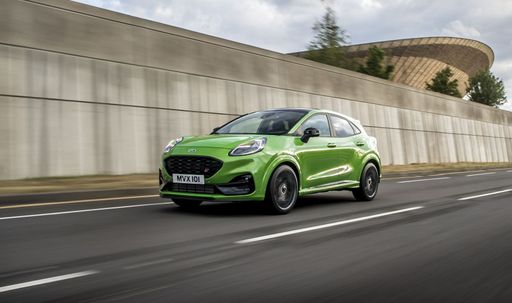 @ puma.fordpresskits.com
@ puma.fordpresskits.com
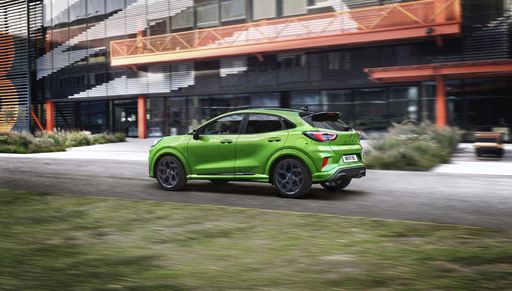 @ puma.fordpresskits.com
@ puma.fordpresskits.com
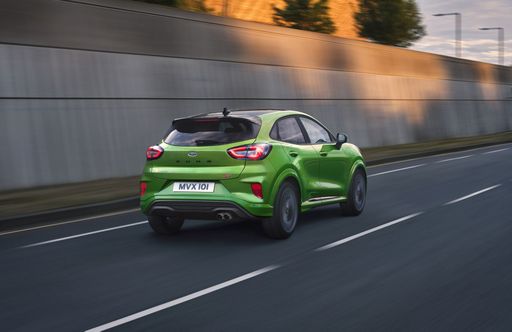 @ puma.fordpresskits.com
@ puma.fordpresskits.com
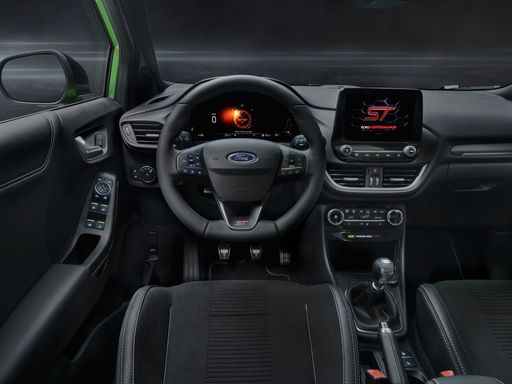 @ puma.fordpresskits.com
@ puma.fordpresskits.com
Skoda Enyaq
The Škoda Enyaq represents a bold step for the Czech manufacturer, embracing a stylish design and environmental consciousness with its electric powertrain. Inside, the cabin offers a blend of comfort and advanced technology, creating a modern driving experience. With its spacious interior and practical features, the Enyaq is perfect for families or anyone looking for a practical yet luxurious electric vehicle.
details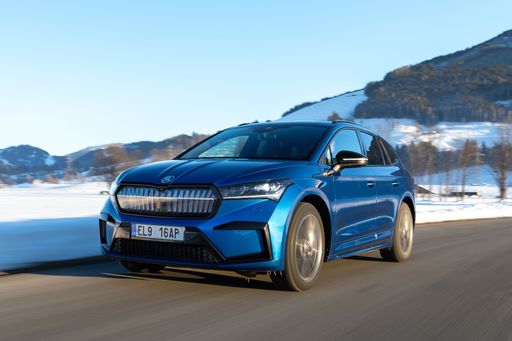 @ skoda-media.de
@ skoda-media.de
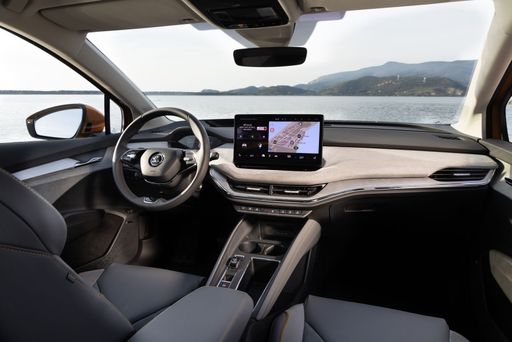 @ skoda-media.de
@ skoda-media.de
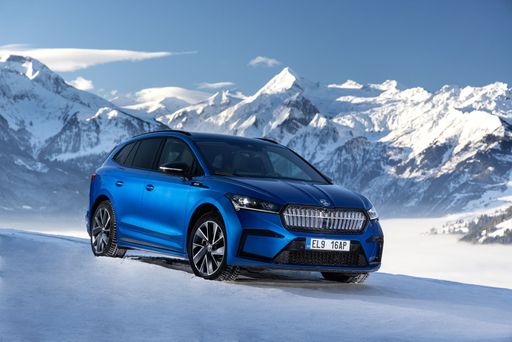 @ skoda-media.de
@ skoda-media.de
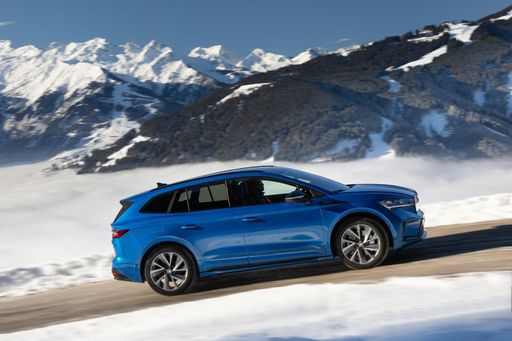 @ skoda-media.de
@ skoda-media.de
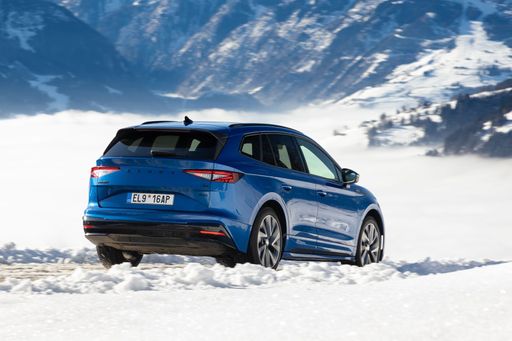 @ skoda-media.de
@ skoda-media.de

|

|
|
|
|
Costs and Consumption |
|
|---|---|
|
Price
24800 - 36300 £
|
Price
38100 - 52200 £
|
|
Consumption L/100km
5.4 - 6 L
|
Consumption L/100km
-
|
|
Consumption kWh/100km
13.1 - 13.7 kWh
|
Consumption kWh/100km
14.8 - 16 kWh
|
|
Electric Range
364 - 376 km
|
Electric Range
428 - 587 km
|
|
Battery Capacity
43 kWh
|
Battery Capacity
59 - 79 kWh
|
|
co2
0 - 136 g/km
|
co2
0 g/km
|
|
Fuel tank capacity
42 L
|
Fuel tank capacity
-
|
Dimensions and Body |
|
|---|---|
|
Body Type
SUV
|
Body Type
SUV
|
|
Seats
5
|
Seats
5
|
|
Doors
5
|
Doors
5
|
|
Curb weight
1316 - 1563 kg
|
Curb weight
2002 - 2293 kg
|
|
Trunk capacity
456 - 523 L
|
Trunk capacity
570 - 585 L
|
|
Length
4186 - 4226 mm
|
Length
4658 - 4660 mm
|
|
Width
1805 mm
|
Width
1879 mm
|
|
Height
1550 - 1555 mm
|
Height
1607 - 1623 mm
|
|
Payload
367 - 469 kg
|
Payload
457 - 520 kg
|
Engine and Performance |
|
|---|---|
|
Engine Type
Petrol MHEV, Electric
|
Engine Type
Electric
|
|
Transmission
Manuel, Automatic
|
Transmission
Automatic
|
|
Transmission Detail
Manual Gearbox, Dual-Clutch Automatic, Reduction Gearbox
|
Transmission Detail
Reduction Gearbox
|
|
Drive Type
Front-Wheel Drive
|
Drive Type
Rear-Wheel Drive, All-Wheel Drive
|
|
Power HP
125 - 168 HP
|
Power HP
204 - 340 HP
|
|
Acceleration 0-100km/h
7.4 - 9.8 s
|
Acceleration 0-100km/h
5.4 - 8.1 s
|
|
Max Speed
160 - 210 km/h
|
Max Speed
160 - 180 km/h
|
|
Torque
170 - 290 Nm
|
Torque
310 - 679 Nm
|
|
Number of Cylinders
3
|
Number of Cylinders
-
|
|
Power kW
92 - 124 kW
|
Power kW
150 - 250 kW
|
|
Engine capacity
999 cm3
|
Engine capacity
-
|
General |
|
|---|---|
|
Model Year
2024 - 2025
|
Model Year
2025
|
|
CO2 Efficiency Class
D, E, A
|
CO2 Efficiency Class
A
|
|
Brand
Ford
|
Brand
Skoda
|
Ford Puma
A Glimpse into the Ford Puma: Fusing Style with Innovation
The Ford Puma stands as a testament to modern engineering fused with style. This compact SUV is not just about aesthetics but brings to the table an array of technical innovations, topped with the reliability and performance Ford is known for. Let's delve into the technical specifics and innovative features that make the Ford Puma a stellar choice for any car enthusiast.
Powertrains and Performance
The Ford Puma is offered with a range of powertrains designed to deliver optimal performance whilst minimising fuel consumption. At the heart of this compact SUV is the 1.0 EcoBoost Hybrid engine, available in both 125 PS and 155 PS variants. This engine is a marvel of engineering, optimised to deliver power efficiently with a remarkable fuel consumption ranging from 5.4 to 5.7 L/100km for manual versions, and slightly higher for the automated variants.
The top-end 1.5 EcoBoost ST variant takes performance up a notch, providing a robust 200 PS that propels the Puma from 0 to 100 km/h in just 6.7 seconds. This variant is perfect for those who prioritise performance and exhilaration in their driving experience.
Mild-Hybrid Technology
The Puma's mild-hybrid technology plays a significant role in enhancing fuel efficiency and reducing emissions. By utilising a belt-driven integrated starter/generator, the Puma recovers energy usually lost during braking, storing it in a 48-volt lithium-ion battery. This stored energy is then used to assist the engine, providing a boost during acceleration and smoothing out the stop-start technology, ultimately leading to enhanced fuel efficiency.
Design and Comfort
The Ford Puma does not compromise on style and comfort with its ergonomic and stylish design. The SUV is available in multiple trims including the ST-Line, Titanium, and the luxurious Vignale editions, each offering unique aesthetic and technological enhancements. These trim levels provide varied offerings in terms of both exterior styling and interior comfort, ensuring there's a Puma that meets every personal preference.
Inside, the Puma offers a driver-focused cockpit with advanced technological integrations such as the SYNC 3 infotainment system, providing seamless connectivity and intuitive control of the vehicle's numerous technological features.
Safety and Technology
Safety remains paramount, and the Ford Puma is equipped with the latest security and technology features. It boasts the Ford Co-Pilot360 suite which includes adaptive cruise control, pre-collision assist with autonomous emergency braking, and lane-keeping assist, enabling a safer driving experience on both city roads and highways.
Versatility and Practicality
Beyond performance and safety, the Ford Puma shines in its versatility. With a boot capacity of 456 litres, it offers ample space for all sorts of adventures, whether you're heading on a family trip or loading sports equipment. Its innovative MegaBox is an extra storage solution, providing additional space below the boot floor.
The Puma's agile handling, paired with its compact dimensions—spanning a length of 4186 to 4266 mm and a width of 1805 mm—makes it an ideal choice for urban commuting and beyond.
Conclusion
In conclusion, the Ford Puma beautifully blends practical features with cutting-edge technology, offering a package that appeals to both the tech-savvy driver and those seeking comfort and reliability. Its range of innovative features, powerful yet efficient engine options, and a design that is both functional and stylish make it a frontrunner in the compact SUV market.
Whether you're drawn by the efficient mild-hybrid engines or the robust performance of the ST variant, the Ford Puma represents a modern driving experience where innovation meets everyday usability.
Skoda Enyaq
Introduction to the Škoda Enyaq: A Leap into Electric Innovation
In the world of electric SUVs, the Škoda Enyaq stands out with its innovative approach and technical prowess. As part of the Volkswagen Group, Škoda has leveraged its rich heritage and cutting-edge technology to introduce a family of electric vehicles that promise a delightful blend of performance and sustainability.
Powerful Performance and Eco-Friendly Efficiency
The Enyaq boasts a powerful electric motor with a remarkable output of 286 PS (210 kW), ensuring agile performance while maintaining an eco-friendly footprint. It achieves an impressive acceleration, going from 0-100 km/h in merely 6.6 to 6.7 seconds, and offers a zero-emission drive, earning it a CO2-efficiency class of A.
Impressive Range and Efficient Power Consumption
The Enyaq offers an impressive electric range of 525 to 573 km, making it an excellent choice for both city driving and long-distance travel. Its efficiency is underscored by a power consumption of just 14.6 to 16.4 kWh/100 km, a testament to Škoda's commitment to sustainable engineering.
Design and Practicality: The Ideal SUV
With dimensions measuring between 4649 and 4653 mm in length, the Enyaq provides a spacious interior that comfortably seats five passengers. The vehicle's design seamlessly integrates aesthetics with functionality, offering a generous boot capacity ranging from 570 to 585 litres and a payload capacity of up to 528 kg.
Advanced Technology and Features
The Škoda Enyaq comes equipped with a state-of-the-art all-electric platform, featuring a robust 77 kWh battery that supports both rear-wheel and all-wheel drive configurations. A top speed of 180 km/h offers exhilarating performance, complemented by a sophisticated automatic transmission system.
Safety and Comfort: A Priority in Every Detail
Safety and comfort remain paramount in the Enyaq, which includes a suite of advanced driver assistance systems and an elegant interior finished with the Sportline trim. The intelligently designed suspension system ensures a smooth ride, enhanced by the quiet efficiency of its electric powertrain.
Conclusion: A Remarkable Journey into the Electric Future
Priced between €48,900 and €58,590, the Škoda Enyaq represents excellent value for money, combining remarkable performance, efficiency, and an array of features. It marks a significant step forward in Škoda's sustainable vehicle offerings, promising a brighter future for eco-conscious drivers.
The prices and data displayed are estimates based on German list prices and may vary by country. This information is not legally binding.
